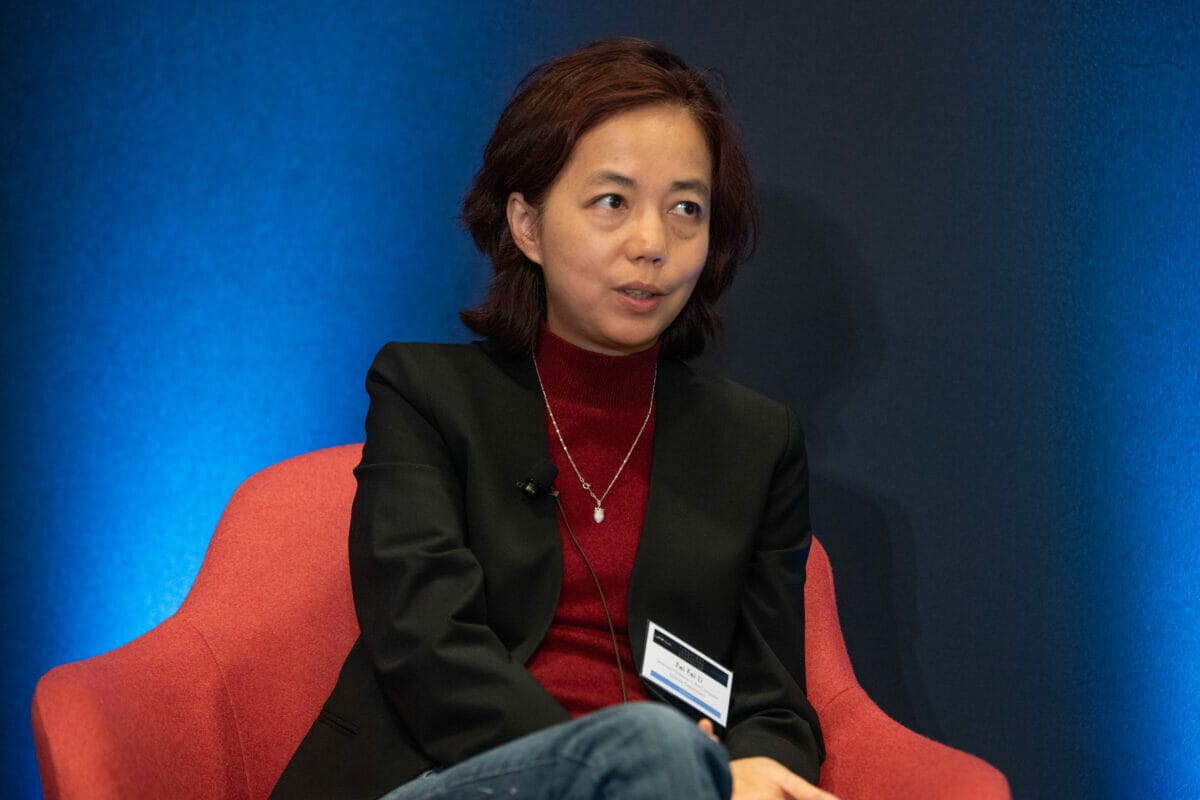Sceptics cautious about the hype surrounding artificial intelligence underestimate the major scientific and civilisational advancements the technology will bring, says former Google Cloud chief scientist Fei Fei Li. She says investors should look beyond household tech names, and explains why Chat GPT-style large language models are just the beginning.
Asked whether artificial intelligence is just another fad, destined for bouts of market mania and malaise like cryptocurrency, Fei Fei Li takes issue with the premise.
“As a Stanford Professor, we are not in the business of hype – we are scholars and technologists,” she told the Fiduciary Investors Symposium, hosted by Top1000Funds.com on the grounds of the famed Californian university campus in September.
“I’ve seen hype cycles and misinformation, but I do genuinely believe this technology has arrived. This is a genuine inflection point in technology.”
Li, a professor of computer science and former Google executive described by Bloomberg as the “godmother of AI”, says the technology being developed in labs like the one she oversees at Stanford will not just trigger a productivity revolution that is advantageous to commerce, as predicted by bullish investors and analysts. Properly applied, it will “boost our civilisation in an accelerative way”, Li said.
While AI-enabled language models have captured global attention since the launch of the ChatGPT tool last year, the next frontier of innovation is the development of models that “understand the physical world” and can interact with it via robotics or other hardware applications, Li said. She gave the example of AI tools cooking an omelette, building flat pack furniture or changing an infant’s diaper.
But these physical world applications would also have vastly beneficial impacts for humanity, Li said, identifying the healthcare sector as being perhaps the example of use cases she is most excited by. AI-enabled medical technology and patient care could greatly alleviate the cost and labour burdens on hospital systems, she said.
Even the current iteration of large language models are assisting rapid advancements in health, she said, with some researchers using AI to comb through centuries’ worth of medical literature in search of new treatments and drugs in light of more contemporary knowledge.
“I am particularly gung ho about healthcare, it’s not easy, but there are so many human lives to be benefited — aged care, companionship, wellbeing, there are a lot of opportunities.”
‘Let’s not be lazy’
For investors, Li said the opportunity was almost unfathomably large given her thesis that AI will become as omnipresent as the internet. “Anything with a piece of software in it right now – your phone, your car, your fridge – tomorrow that will have AI in it,” she said. “It is the new compute. It manifests itself as a computational technology.”
And, as such, many of the largest Fortune 500 and Nasdaq-listed tech companies have understandably made forays into the emerging market, most notably Microsoft’s backing of ChatGPT issuer OpenAI.
However, amid the surging market demand and analyst and press attention, Li warned institutions not to confine their allocations to the promising technology to large-cap public equities.
“I want to invite everyone to rejuvenate this technology,” Li said. “I worry the oxygen is being sucked by a single-digital number of big companies. There’s nothing wrong with them, they’re amazing. But it would be better for many flowers to bloom.”
Professor Stephen Kotkin of Stanford’s Hoover Institution added: “So let’s not be lazy and just go to the big companies that own the cloud.”
But she also warned that funds willing to provide capital to start-ups operating in the AI space should ensure the firms and founders they are backing truly understand the computer science behind their operations, and not just the business use cases.
Asked about the downsides of AI, Li admitted that unregulated application of AI could be “dangerous” and identified misinformation as a key concern.
However, she concluded this was true of almost all groundbreaking technologies throughout history – and that the potential social and economic upsides greatly outweighed the risks.
“I am not a pure utopian,” she said. “To promise [only good would come from AI] would be a little irresponsible, because along the way this technology, plus the pitfalls of human nature, creates landmines.
“[But] from the time we build axes with stones we knew those tools could be used positively and negatively.”



